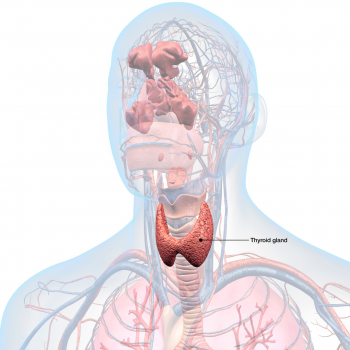

What are possible solutions for low thyroid levels?
In part 1 of our 2 Part series on hypothyroidism of we discussed symptoms of a low thyroid including: cold intolerance, fatigue, sluggish metabolism (inability to lose weight), sluggish bowels like constipation, poor memory, dry skin, and even swollen tongue. I also mentioned the importance of getting a FULL thyroid panel including: TSH, Free T4, Free T3, Reserve T3, and thyroid Antibodies. So, IF you have symptoms and your thyroid labs are also showing they are not truly optimal, today we are going to discuss possible solutions for low thyroid levels.
What Nutrients are Necessary for Thyroid Function?
Remember how I said in the past video that many of my patients do not convert their T4 to T3 well? This can be due toxins like alcohol, pesticides, mercury, and lead, various medications such as birth control pills, steroids, beta blockers, even too much of foods like soy, and lastly nutritional deficiencies in selenium or zinc. It can also be due to elevated thyroid antibodies or adrenal stress.
So, what can we do to improve thyroid hormone production and improve T4=T3 conversion?
- Reduce Stress
- Support Detoxification
- When possible get off medications
- Take nutrients needed to make and convert thyroid hormones.
Today I want to focus on the last point-take nutrients needed to make and convert thyroid hormones.
T4 and T3 are made out of a tyrosine backbone which is an amino acid and 3 or 4 iodine molecules.
Iodine is an essential trace mineral and is necessary for the synthesis of thyroid hormones, as it is one of the most important components of the hormones T4 and T3.
So, you need both tyrosine and iodine to make them.
The minerals zinc and selenium are required cofactors for the enzymes that convert T4 to T3. Selenium deficiency has been shown to contribute to decreased T4 to T3 conversion. Supplementation of selenium can also help decrease thyroperoxidase (TPO) antibodies in thyroid autoimmunity. Supplementation with zinc has been shown to restore T3 levels in patients with normal T4 and low T3, demonstrating its role in the conversion process. Vitamin A and vitamin E are also necessary for normal thyroid hormone manufacturing.
Increased free radical activity (oxidative stress) can compromise healthy T4 to T3 conversion. N-acetyl cysteine (NAC), a precursor to the body’s master antioxidant glutathione, boosts thyroid health by accelerating antioxidant activity in the thyroid gland.
Turmeric (Curcuma longa), along with the antioxidants vitamin C and E, has been shown to promote a healthy thyroid gland due to direct antioxidant activity. Plus turmeric is anti-inflammatory.
Ashwagandha (Withania somnifera) has been used in Aryuvedic and indigenous medical systems for over 3,000 years and has been examined in research studies for its stress-lowering effects. It can help to relax the nervous system and still stimulate thyroid activity.
Guggulipid (Commiphora mukul) has been shown to support thyroid function, primarily by decreasing lipid peroxidation in the liver, the principal site of T3 generation. Guggul extract has also been shown to have thyroid-stimulating action by increasing iodine uptake by the thyroid gland and increasing the activities of thyroid peroxidase and protease.
Take a high-quality supplement
The best blend I’ve seen to support thyroid hormone production is our Thyroid Complex which is a comprehensive formulation that provides a blend of nutrients and botanicals working in synergy to support thyroid health.
It includes L-tyrosine and iodine, which make up the backbone of the thyroid hormones hyroxine (T4) and triiodothyronine (T3). It also contains zinc and selenium I mentioned. It also has turmeric, along with the antioxidants vitamin C and E and N-acetyl cysteine (NAC), which provide a powerful combination of antioxidants that boost thyroid health by reducing free radical stress, and ashwaganda and guhgulipid.
Thyroid Complex can do the following:
- Help to Maintain Healthy Thyroid Function
- Promote the Synthesis of Thyroid Hormones
- Help Support Conversion of T4 to T3
- Improve Cellular Sensitivity to Thyroid Hormones
Change your diet
Lastly, IF you have elevated thyroid antibodies, what else can you do? Change your diet to gluten-free eating. Let me explain why.
When the thyroid is inflamed and leaks out thyroid peroxidase enzymes (which look like gluten), a body on alert for gluten may also attack those thyroid enzymes. That creates thyroid peroxidase antibodies, which leads to autoimmune thyroid disease, Hashimotos if low thyroid is present and Grave’s disease if high or overactive thyroid is present. However, this process doesn’t only create autoimmune conditions in the thyroid, it can create other autoimmune conditions, such as multiple sclerosis, rheumatoid arthritis, and others. If you have an elevation of these enzymes you want to stop fueling that potential autoimmune fire. Avoid gluten is most important. Gluten is the protein found in wheat barley rye and oats (unless the oats are gluten-free). You may need to avoid other foods as well and this is where food sensitivity testing is very valuable to help you determine which foods you should be avoiding.
In summary, many of my patients’ thyroid antibodies have reduced significantly by changing their diet and taking the nutrients discussed above. Watch my video to learn more!
Wellness is waiting. Are you ready?
What did you think of this video from Dr. Stephanie Gray?
- Subscribe to the Your Longevity Blueprint YouTube channel for more wellness information.
- Comment below and tell me how this has affected you and what questions you may have.
- Share this post with your community so they can discover what to do about low thyroid levels. To share, please click on the social media sharing buttons below.
- Purchase the supplements mentioned in today’s video (linked below).
*Always share with your medical provider what supplements you are taking*
*Always share with your medical provider what supplements you are taking*
